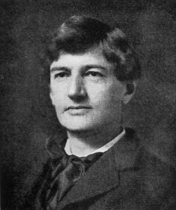“The greatest joy in nature is the absence of man.”
New York Times review of Mr. Carman's Prose; A Volume Of Little Essays By The Canadian Poet. (1903).
William Bliss Carman, , né à Fredericton au 83 Shore Street le 15 avril 1861 et mort à New Canaan le 8 juin 1929, est un poète, essayiste, journaliste et directeur littéraire canadien anglophone. Il a passé la plus grande partie de sa vie aux États-Unis. Il fut un membre éminent de la Confederation School of Canadian Poetry. Il était également membre de la Société royale du Canada en 1925 et a reçu la médaille Lorne Pierce en 1928 et la Gold Medal for Distinguished Achievement - devenue Médaille Robert Frost - délivrée par la Poetry Society of America .
Carman a écrit de nombreux recueils où il se fait le chantre de la nature et de la joie de vivre ; quelques-uns de ses poèmes rappellent des événements de l'histoire du peuple acadien. On retient surtout Low Tide on Grand Pré , Songs from Vagabondia et Ballads of Lost Haven .
Il est enterré au cimetière Forest Hill Cemetery de Fredericton. Ses manuscrits sont consultables auprès des Stanford University Archives.
Wikipedia

“The greatest joy in nature is the absence of man.”
New York Times review of Mr. Carman's Prose; A Volume Of Little Essays By The Canadian Poet. (1903).
The full toast, as reported in New York Sun. Quoted in John Coldwell Adams, Confederation Voices http://www.uwo.ca/english/canadianpoetry/confederation/John%20Coldwell%20Adams/Confederation%20Voices/chapter%203.html, 2007.
A Toast, reported in Bartlett's Familiar Quotations, 10th ed. (1919).
“There paused to shut the door
A fellow called the Wind,
With mystery before,
And reticence behind.”
At the Granite Gate, reported in Bartlett's Familiar Quotations, 10th ed. (1919).
“The glad indomitable sea,
The strong white sun.”
A Sea Child, reported in Bartlett's Familiar Quotations, 10th ed. (1919).